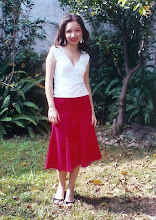Berlin, Day 5.
This morning I awoke to the unmistakeable sounds of heavy rain. This is not good for biking, not good at all.
I had changed hostels yesterday, I was now in a very comfy, clean, friendly place (staff German!) with no rules and what's more, no roommates, so I decided to take the day off from biking. "Punting", we used to call it at my old university. :D
So I slept late, showered at midday, read some Adam Smith (he has a delightfully funny take on Columbus's meanderings in discovering America), and later in the day when I got bored of staying indoors (it was still raining outside) I headed over to Berlin's Jewish History Museum.
Now, I had visited this museum a couple of days ago, but had arrived just 1 hour before closing, which did not give me time to see half of the most excellent exhibit there. The whole building itself (i.e. the architecture) is part of the exhibit, and what's more, the things displayed there, and the way they are explained, is extremely well done, and is the best museum of its kind I have ever encountered.
Take the architecture, first. The building was designed by Daniel Libeskind, who, by the way, won the commission for the master plan for the reconstruction of the World Trade Center. You can take a look about how the architecture contributes to the "statement" that the building makes (not just its contents) in the words of Libeskind himself here. But the point is, that walking through the building does, indeed, invite some reflection, which is precisely what he was trying to accomplish. A visit to the Holocaust Tower, in particular, is rather poignant.
Speaking of which, one of the things that makes this Museum so wonderful, I think, was the fact that it does not focus on the Holocaust per se. There...are enough places that do that already, and the quiet, understated way in which it is mentioned here, only towards the end, after showing the thousands of years of Jewish history frm Roman times to the present, you arrive to a little quiet workspace with a desk, with bookcases behind, holding the archives, of the names and birthplaces of all the Jewish people murdered, and which you can peruse at your leisure be it for research or personal reasons.
But most importantly, the rest of the exhibit, tracing the development of Judaism right from the beginning, is incredibly clear, engaging (lots of "Write your name in Hebrew here!" or "Listen to the sounds of two Yiddish merchants talking here!" and other suchlike fun interactive multimedia exhibits, for instance), and informative. It really does do a great job of showing the cultural richness, the treasure inherent in these peoples and culture, and which again, ties in with the "blanks" left intentionally in the structure of the building by Libeskind to make the point, understated elsewhere in the exhibit, of all that was lost during the Holocaust.
But what I enjoyed the most was discovering all the good things that are inherent in the Jewish culture. Their values, for instance, emphasizing education. The strong and intelligent women this culture has produced. The beautiful tradition of passing down the sweet-smelling spice boxes at the end of Havdalah ("separation"), to mark the end of Shabbat and to start again the week in an uplifted, happy, tone. The humorous and ingenious personalities, which value wit and resourcefulness more than the superficial qualities our modern culture seems to do too much, for instance:
Goes the story that Moses Mendelssohn (grandpapa of musician Felix Mendelssohn Bartholdy, whom I've told you quite a bit about before), a reputedly very ugly man, won his beloved over with the following story:
"When a baby is born in Heaven, they tell him who his future wife is going to be. They told me my wife would be a hunchback. 'Oh God,' said I, 'A girl that's deformed easily becomes hard and bitter. Please, let me have the hump, so she can be pleasant and beautiful instead.'"
It worked. :)
Moses Mendelssohn was such a remarkable personality (he was well known thinker of his time), that there is even a Jewish saying:
"From Moses to Moses there's no one like Moses"
or, in other words:
"From Moses to Moses (Maimonides/Isserles?) there's no one like Moses (Mendelssohhn)".
Cool, huh?
Here's another one:
Mendelssohn (grandpapa) was invited to court in Potsdam in 1771. On that day, it was a Jewish holiday, and as no one was working he had to walk to the gates of the palace. He presented his invitation to the guard, who, as it was rather rare to see Jews in court, asked Mendelssohn his profession. The answer: "I do magic tricks."
:)
Anyway, do go to this museum if you are ever in Berlin. It is one of the neatest things I have seen in this city.

No comments:
Post a Comment